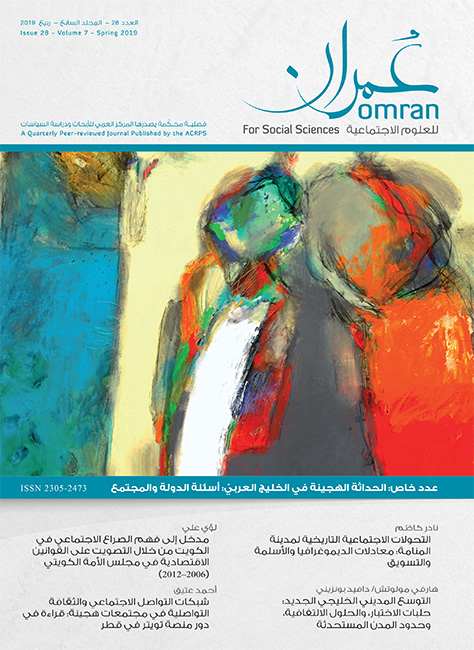
The Arab Center for Research and Policy Studies has published the 28th issue (Spring 2019) of its quarterly peer-reviewed journal Omran, dedicated to the social sciences. This edition tackles "Hybrid Modernity in the Arab Gulf: Questions of State and Society". It includes a collection of studies and book reviews that deal with the political, social and cultural transformations in the Arabian Gulf societies. They examine the relationship of these societies to the development of the rentier state and the emergence of patterns of hybrid urbanization that has produced a special type of Arab city. Also featured in this edition is an Arabic translation of William H. Sewell, Jr's "A Theory of Structure: Duality, Agency, and Transformation," a popular text combining structure and social action theories. The issue provides four reviews of recent books on the evolution of political systems and markets in the Gulf States and displays the paintings of Qatari artist Salman Al Malik.
Contributions to Gulf Urbanization Patterns
The first articles featured study the Gulf urbanization patterns in the cities of Manama, Dubai, Abu Dhabi, Doha and Kuwait. The study by Professor of Cultural Studies at the University of Bahrain, Nader Kadhim, dealt with the political, economic and historical factors that contributed to the restructuring of the urban and social architecture of Manama since the mid-1970s, from the recession of pearl trade and the discovery of oil to the oil boom and the range of political measures along the way. Kadhim's "Transformations of Manama: Equations of Demography, Islamization and Commercialization" notes that urbanization policies have opened the door to the arrival of large numbers of poor, unskilled or middle-class foreign workers, whose dominant presence over much of the Old City and the surroundings is steadily increasing. This has led to the growth of political Islam trends, the emergence of cultural challenges for the Bahraini identity, and the attempt to turn old Manama into a destination for domestic and foreign tourism.
Harvey Molotch, Professor Emeritus of Sociology at the University of California at Santa Barbara, and Davide Ponzini, associate professor of urban planning at the Polytechnic University of Milan, address the study of hybrid modernity in the cities of Dubai, Abu Dhabi and Doha in their article, "The New Gulf Urban: Test Beds, Work-arounds, and the Limits of Enacted Cities." The researchers contested cultural perceptions of an orientalist nature that hint at social and political backwardness and inequality as well as cultural dependency on the the West. They stressed that Gulf cities could be considered as new models for understanding emerging urbanization trends as they cross national boundaries and how they interact with physical structures and local social systems, which are forced to develop institutional solutions that lead to different forms of hybridization.
The Rentier State in Kuwait and the Virtual Space in Qatar
Luai Ali, an assistant professor at the Doha Institute explores social conflict in Kuwait using voting patterns on economic legislation in the national assembly as an example. The paper builds an explanatory model to study the strategies of rent distribution through voting within the Kuwaiti National Assembly. Ali presented a reading of the social conflicts in the rentier states that transcends reductionist view that assumes an absence of any class or social conflict in these countries or reduces them to a simple struggle over rent.
Ahmed Atyq provides an article that examine the Social Networks and Communication Culture in Hybrid Societies, looking at the role of Twitter in Qatar.
Building on communication theories, Atyq sought to understand the profound impact of the transformation of public communication space in Qatar in the age of digitization and networking and its role in changing communication culture. He indicates the importance of these networks as a public space beyond the structural obstacles produced by urbanization patterns in the Arabian Gulf.
Translation and Book Reviews
Featured in the Translation Section is Thaer Deeb's Arabic rendition of William H. Sewell, Jr's "A Theory of Structure: Duality, Agency, and Transformation," one of the most important attempts to combine critique of Anthony Giddens' the duality of structure and Pierre Bourdieu's notion of habitus, based on the fact that the possibility of change is an integral part of the concept of structure.
The issue includes four book reviews on various aspects of the evolution of political and social systems as well as markets over the past 50 years. Abdou Moussa reviews Modernism in the Arabian Gulf: Transformations of Society and the State by Baqer Alnajjar, which studies the juxtaposition of modernity and tradition in the Gulf. Courtney Freer reviews Bedouins into Bourgeois: Remaking Citizens for Globalization by Calvert Jones, which studies the development of the relations between the citizen and the state in the UAE.
This issue also includes reviews two recent books on the political economy of the Gulf states. Freer returns to review "Money, Markets, and Monarchies: The Gulf Cooperation Council and the Political Economy of the Contemporary Middle East " by Adam Hanieh. This book examines the indicators of the growing influence of the six Gulf Cooperation Council countries over the past two decades, and their impact on shaping the political economy of the Greater Middle East. Finally, Baqer Alnajjar critically reviews of Exporting Wealth and Entrenching Alienation: A History of Productive Imbalance in the Gulf States by Omar El Shehabi, which tracks the evolution of forms of production that have grown and developed with the discovery of oil and the use of its revenues for the "forced integration" of the societies of the region into the global economic system.
The journal is available for purchase at the Omran website where selected studies and reviews are also available for free download.